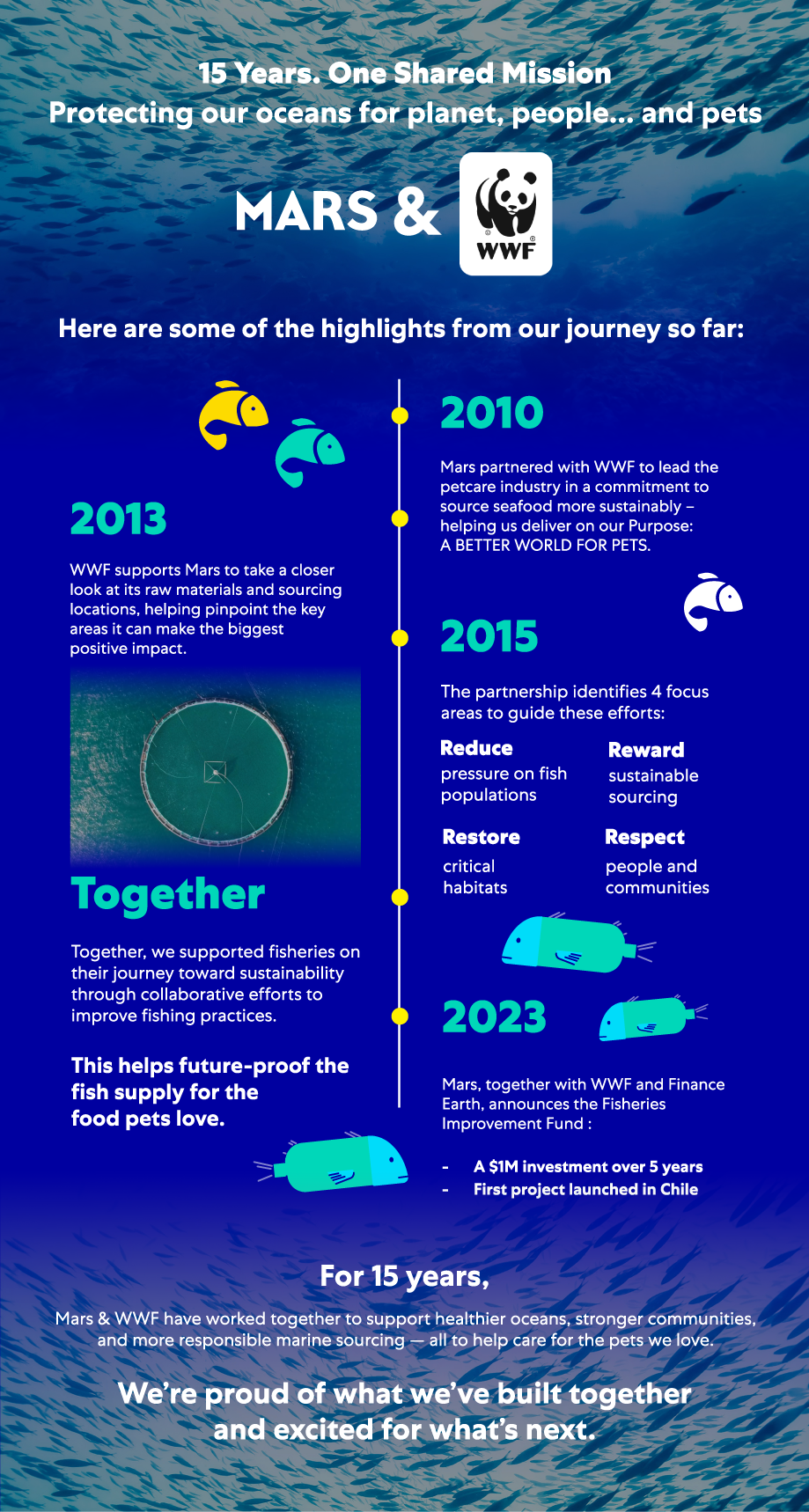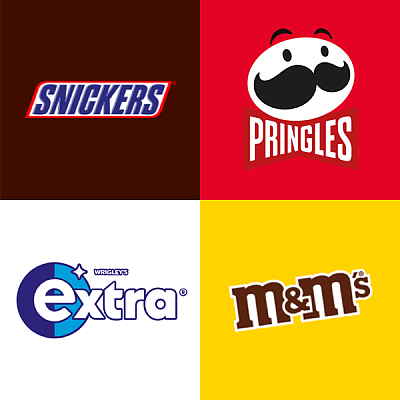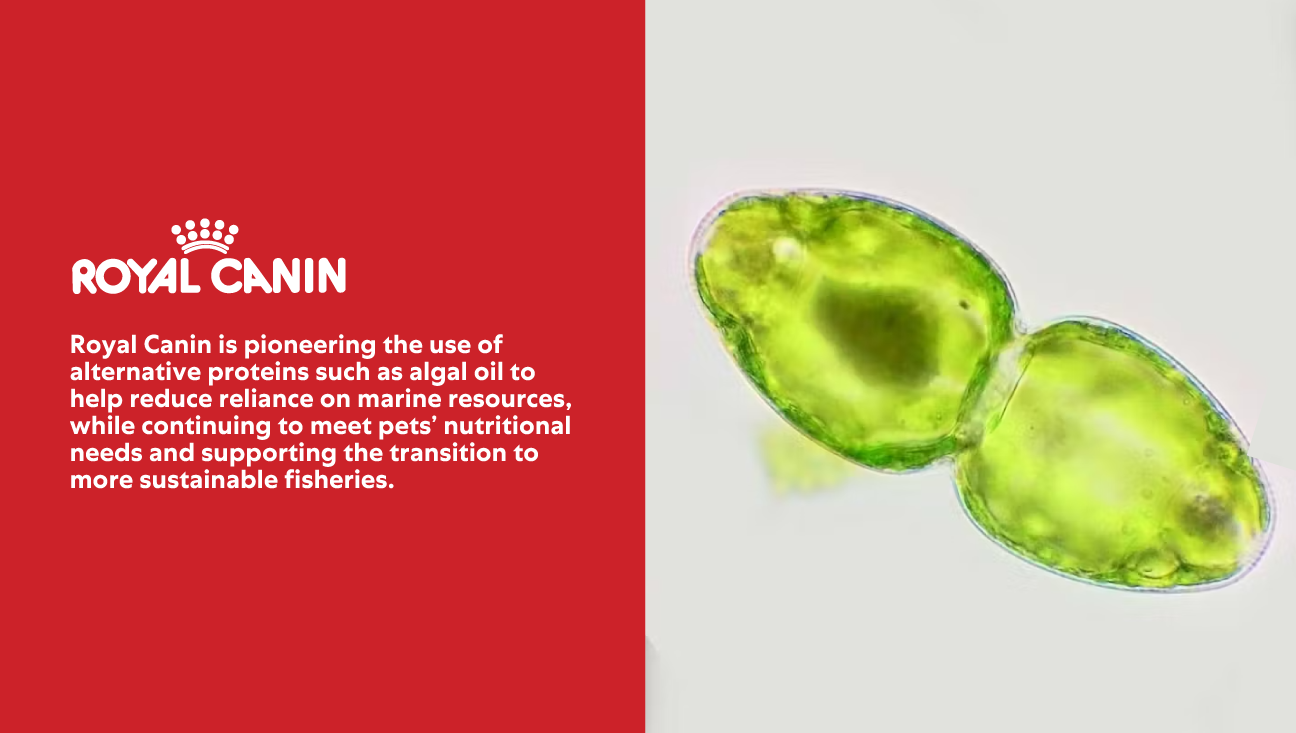Protecting ocean ecosystems
At Mars, we’re working to drive positive change for people, pets and our planet.
As part of this, we are continually looking for more sustainable ways to source all our raw materials, help reduce our climate impact, help protect vulnerable people and ecosystems and drive responsible practices.
Fish and marine ingredients are an important source of nutrients in many of our pet food brands, such as SHEBA® and WHISKAS®. Our aim is to drive improvement in environmental and social practices in the industry, while helping to promote biodiversity and protect endangered species and critical habitats.
Building a sustainable future for oceans means conserving and responsibly using marine resources - ensuring the health and resilience of ocean ecosystems, while also supporting coastal communities and the livelihoods that depend on them. In doing so, we not only protect nature and livelihoods, but help secure high-quality nutrition for pets in the future.
Sustainable Fish Sourcing
Fish and other seafood are vital to healthy diets, future food security, and the livelihoods of around 3 billion people worldwide1. Yet today, mounting pressures, from overfishing to pollution to climate change, threaten the resilience of ocean ecosystems, putting at risk food security, livelihoods, and wellbeing2
Collaborating with WWF for over 15 years to drive lasting progress
We’re proud of our longstanding partnership with World Wildlife Fund (WWF). Since 2010, their expertise has helped strengthen our sourcing standards and guide us to identify the key areas where we can make the biggest positive impact.

Supporting fishery improvement projects
Fishery Improvement Projects (FIPs) bring together multiple stakeholders in the supply chain to address environmental challenges. FIPs work to make fisheries more sustainable by implementing action plans to improve fishing practices and management.
In 2023 Mars joined WWF and Finance Earth to launch a Fisheries Improvement Fund (FIF), a new concept to finance FIPs to address the overexploitation of fisheries. Mars committed to provide $1 million to the Fishery Improvement Fund to be invested into FIPs over the next five years.
Through this innovative blue finance mechanism, Mars is supporting the development of new models that can provide a consistent source of funding for global fisheries reform, with a clear aim to positively impact our oceans.
A focus on Chile’s fisheries
As part of our investment, we are working alongside World Wildlife Fund (WWF), Finance Earth (FE), and leading industry partners to design and implement a Fishery Improvement Project (FIP) in Chile, funded by the Fisheries Improvement Fund (FIF). This first project is focused on financing the transition to sustainable marine ingredients in one of the world’s most ecologically essential seascapes in Chile.
Chile’s marine ecosystems are rich in biodiversity and productivity - Chilian anchovies produce fish oil; a critical ingredient providing Omega 3 and vital fatty acids for pets to have a healthy lifestyle. Despite this, some fisheries in Chile that provide these important ingredients are confronted by a range of challenges. This investment will help the Anchoveta & Araucanian Herring fishery in Chile to improve livelihoods for local communities, mitigate supply chain risks and move forwards on a responsible, and ultimately sustainable footing by meeting MSC standards.
Our No-Krill policy
We recognize that krill are a crucial part of the ocean food web, especially in Antarctic ecosystems, and their populations face pressure.
Krill provides a vital food source for marine life including whales, seals and penguins. As part of our commitment to responsible fish sourcing, we do not use krill in any of our pet food products and we avoid ingredients that could threaten delicate marine ecosystems.
Supporting seafood workers
Addressing human rights challenges is essential for creating a resilient supply chain. Mars understands the complexities faced by the seafood sector, especially concerning responsible recruitment and human rights risks. To tackle these issues, Mars actively collaborates with the industry and participates in initiatives like the Seafood Taskforce.
Our Thai fish human rights program is dedicated to addressing risks such as responsible recruitment and health and safety concerns in both factories and on vessels. The program employs two key strategies: supporting third-party experts who work with suppliers to address root causes and enhance human rights management systems, including building capacity in responsible recruitment through AIM-progress industry collaboration, and leading industry groups to standardize responsible recruitment practices, improve remediation efforts, and amplify worker voices.
Tackling ocean plastic
Protecting the ocean means addressing every part of the system, including how packaging is made, used, and disposed of. When packaging is not properly managed, it can escape waste systems and end up in the ocean, threatening marine ecosystems and wildlife.
We are striving for a future where packaging never becomes waste by focusing on three key areas:
- Eliminating Unnecessary Packaging: Reducing the use of packaging that isn't needed.
- Redesigning for Circularity: Transitioning to recyclable mono-materials and incorporating recycled content.
- Investing in Closing the Loop: Enhancing collection infrastructure and forming partnerships to ensure packaging is reused and recycled effectively.
Through these efforts, we aim to help keep packaging out of waterways and oceans while continuing to deliver safe, high-quality food for pets.
Increasing transparency and enhancing traceability
We believe greater transparency and traceability is an important way we can strengthen the integrity of marine supply chains, safeguarding both ocean health and the wellbeing of seafood workers and ocean communities. In partnership with Wholechain and the Global Dialogue on Seafood Traceability, Mars has launched a blockchain-based traceability program, to support our aim for a fully traceable supply chain to origin. In 2025, we also became the first pet food company to publicly disclose our fish supply chain for Royal Canin and our Pet Nutrition brands through the Ocean Disclosure Project - a significant milestone on our journey towards greater transparency.
Coral Reef Restoration
“Coral reefs are one of the most biodiverse marine systems. They pack 25% of all marine life into less than 0.1% of the ocean floor.” Professor David Smith, Chief Marine Scientist, Mars, Incorporated, and Senior Director, Mars Sustainable Solutions.
Due to climate change, pollution and habitat destruction, over 50% of the world's reefs have been lost in the past 50 years.3 The 2023/2024 El Niño event exacerbated this crisis, triggering the fourth global coral bleaching event recorded by NOAA, with rising ocean temperatures putting reefs under immense stress.
We are taking clear action to restore coral reefs through Mars Sustainable Solutions and the Sheba Hope Grows™ program
Coral reefs, often called ‘the rainforests of the sea’ are the foundation of a healthy ocean food web, with 25% of all marine species depending on them4. Today, Mars leads one of the world’s largest coral reef restoration programs*. Since restoration efforts began in 2011, we have established 72 reef restoration sites in 12 countries5. For over a decade, our Mars Sustainable Systems (MSS) team has been collaborating to restore coral reefs at an ecologically relevant scale by working hand-in-hand with local communities, scientists, and NGOs to rebuild coral reefs. By combining science with indigenous knowledge, MSS tailors restoration methods for each site’s unique needs, while investing in training and local capacity building to empower the people on the ground restoring reefs.
The SHEBA brand has made a long-term investment to support ocean sustainability
In 2021 we expanded efforts by launching the Sheba Hope Grows™ program, establishing our flagship restoration site at Hope Reef in Indonesia. Since restoration began at Hope Reef, coral growth has increased from 2% to nearly 70%, fish populations have increased by more than 900% and there’s been a 58% rise in the number of fish species according to data from Mars internal monitoring program6.
Today the program is increasingly becoming a powerful way to deepen SHEBA’s connection with pet parents. SHEBA not only wants to offer pet parents high-quality food but also the opportunity to make a positive impact. Currently 83% of SHEBA’s fish recipes in Europe hold the blue MSC label, and the brand is also inspiring collective action through storytelling platforms like the Reef Builders documentary - which celebrates the extraordinary people restoring coral reefs around the world.
1 Seafood Watch(Opens a new window)
2 WRI, 2025(Opens a new window)
5 Data monitored by the MSS team and MSS partner network, MSS Impact Report, 2024(Opens a new window), p16 in terms of restoration sites and partners
6 Data taken across a five-year monitoring period (2019-2024) in line with the Mars internal monitoring program(Opens a new window).




